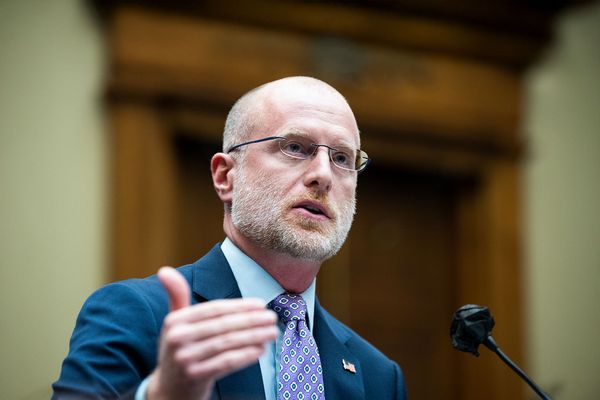
A nonprofit backed by a venture capitalist and the Commonwealth Bank that apparently isn’t a think tank has held its first panel event in Sydney.
Launching earlier this year, Amplify has promised to deliver “the rigour of a think tank with the heart of a community organisation” to find solutions to Australia’s biggest problems and then deliver those to government.
Crikey attended the panel — titled “The Great Divide: Is Australia at risk of becoming as polarised as the US?” — which was moderated by comedian Adam Spencer and featured Network 10 presenter Waleed Aly, Quillette founder Claire Lehmann and former ACTU secretary Bill Kelty.
Despite the promise of potentially “spicy” disagreement in store, with the crowd at the Sydney Theatre Company’s Wharf 2 handed pens emblazoned with the tagline “Find Uncommon Ground”, there was very little by way of controversy between the three speakers.
Perhaps that was why no members of Amplify’s high-profile board seemed to be in attendance — former NSW premier Dominic Perrottet, Tabcorp and former AFL CEO Gillon McLachlan, former Queensland Labor government minister Kate Jones, Bunnings managing director Michael Schneider, and The Daily Aus co-founder Zara Seidler all sit on the board, but none were spotted in the audience.
The board’s chair, Seek co-founder Paul Bassat — who more recently co-founded the $3 billion venture capital startup Square Peg — tipped in his own family’s money to Amplify. Some have claimed Amplify isn’t a think tank, but the organisation is in the midst of running a focus group (in their parlance, an AMPLIFICATION) on housing, where successful applicants will receive $450 to participate in “deliberative polling” on housing reform.
Asked by Spencer to first identify themselves on a political sliding scale of 1-10, with 1 being nominally left and 10 being nominally right, Aly opened proceedings by saying he liked to think he exists “on a third axis … I’ve previously argued in print that left and right are meaningless terms”.
“I would, however, say I’m contractually obliged to be a 5,” he joked.
Lehmann, however, was more forthcoming, describing herself as “probably a seven”, later describing herself as “centre-right”. It was in contrast to Kelty, a key figure in the establishment of the Keating-era Accords, who said he stopped referring to binary left-right scales “when he was 13 or 14”. Kelty went on to describe himself as “unashamedly socialist”.
All three agreed vehemently that the US election was reflective of the material economic conditions facing Americans, with Aly describing it as “in many ways, an utterly normal and remarkable election”.
“You [had] a historically unpopular administration … presiding over a cost of living crisis with inflation, particularly hitting food, and that administration got kicked out of office. Frankly, it would be astonishing if they didn’t,” he said.

Lehmann, while acknowledging that material conditions contribute significantly to polarisation, focused much of her election analysis on gender divides in American voters, speaking of an election-night party she attended on Manhattan’s Lower East Side filled with Gen Z men who were celebrating Trump’s victory.
“It was clear to me that gender was an issue, particularly for the younger people that I spoke to,” Lehmann said.
All three also agreed on the importance of maintaining trust in public institutions, with Aly saying Australia should “build a monument” to the Australian Electoral Commission, lauding the agency’s apolitical nature.
Aly noted that many of the “drivers of polarisation are where our informational ecosystem meets our sense of precarity … [In Australia], our informational ecosystem is horrific, largely because it’s imported from America”.
“Thirty-eight percent of Australians don’t have confidence that our elections are fair [at least most of the time]. We have 54% of people only who believe courts generally make impartial decisions [all or most of the time]. All the indices of an imported loss of faith in institutions that underwrites this polarisation are present,” he said.
All three also agreed on the importance of housing as an issue key to both the US election and the looming Australian federal election. Lehmann noted that young people born in the 1990s and beyond “can’t expect to have better financial prospects than their parents”, and with the mix of economic conditions facing young people today, “you’ve got a recipe for quite severe alienation”.
Kelty agreed, noting that he recently had lunch with several ACTU members who were all both “a member of the Communist Party at some stage in their life” and also “multi-millionaires”.
“It is not a world for whingers like us, mate. There is no place for us to whinge,” he said, saying that young people were going to “miss out” on owning a home because Australia had “lost the capacity to build sufficient homes”.
Following around an hour of friendly agreement came audience questions, with a young man identified as Mark, aged 20, who described the “current Australian leadership as hopeless in all facets and parties”. Mark, who was sat next to John-Paul Baladi, the Liberal mayor of Strathfield in Sydney’s inner west, said he just “vote(s) what my parents vote, and I’ve only believed in either Dutton or Albanese, the major party leaders. And I feel like there’s not a lot of passion in those leaders and for their country”.
Mark cited housing as a “major issue” for him, and Lehmann pointed to the recent polling success of Canadian Conservative Party leader Pierre Poilievre, whose party leads the incumbent Liberals among young voters. Poilievre proposes to abolish Canada’s Housing Accelerator Fund (similar to Australia’s Housing Australia Future Fund) and abolish the goods and services tax on new builds.
Asked to provide one key takeaway for the audience, Kelty said there were “a lot of people in this country being left behind. Don’t leave people behind, and fight for them, and fight for them every day”, adding that Indigenous peoples had been “left behind”.
Lehmann said, “Our democratic processes are one of the best things about this country, we should all be proud of them every time we participate, and we should always ensure that we do participate.”
Aly urged the audience to “think about democracy (as) … something that is a daily practice that drives how you interact with your fellow citizens”.
“Find an issue that you genuinely don’t understand the opponent’s view (of). Find a friend who has that view … and look them in the eyes while they explain to you why they hold that view.”
Have something to say about this article? Write to us at letters@crikey.com.au. Please include your full name to be considered for publication in Crikey’s Your Say. We reserve the right to edit for length and clarity.







